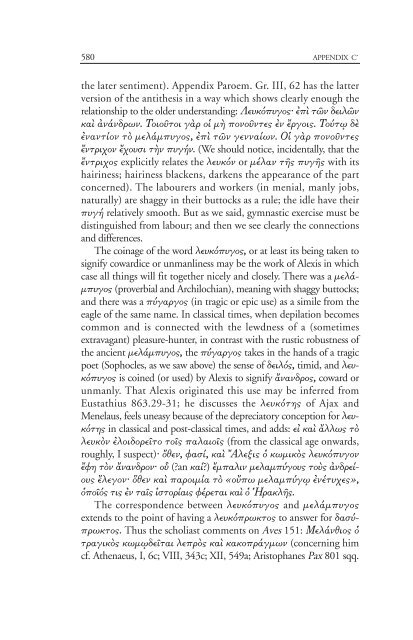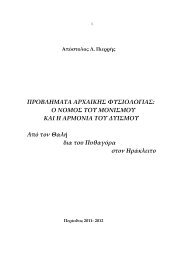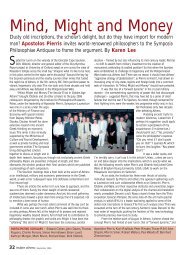APPENDIX C΄ ON DEPILATION: BODY COSMETICS IN CLASSICAL ...
APPENDIX C΄ ON DEPILATION: BODY COSMETICS IN CLASSICAL ...
APPENDIX C΄ ON DEPILATION: BODY COSMETICS IN CLASSICAL ...
You also want an ePaper? Increase the reach of your titles
YUMPU automatically turns print PDFs into web optimized ePapers that Google loves.
580 <strong>APPENDIX</strong> <strong>C΄</strong><br />
the later sentiment). Appendix Paroem. Gr. III, 62 has the latter<br />
version of the antithesis in a way which shows clearly enough the<br />
relationship to the older understanding: §Â˘Îfiapple˘ÁÔ˜Ø âappled ÙáÓ ‰ÂÈÏáÓ<br />
ηd àÓ¿Ó‰ÚˆÓ. TÔÈÔÜÙÔÈ ÁaÚ Ôî Ìc appleÔÓÔÜÓÙ˜ âÓ öÚÁÔȘ. TÔ‡Ùˇˆ ‰b<br />
âÓ·ÓÙ›ÔÓ Ùe ÌÂÏ¿Ìapple˘ÁÔ˜, âappled ÙáÓ ÁÂÓÓ·›ˆÓ. Oî ÁaÚ appleÔÓÔÜÓÙ˜<br />
öÓÙÚȯÔÓ ö¯Ô˘ÛÈ ÙcÓ apple˘Á‹Ó. (We should notice, incidentally, that the<br />
öÓÙÚȯԘ explicitly relates the Ï¢ÎfiÓ or Ì¤Ï·Ó Ùɘ apple˘Áɘ with its<br />
hairiness; hairiness blackens, darkens the appearance of the part<br />
concerned). The labourers and workers (in menial, manly jobs,<br />
naturally) are shaggy in their buttocks as a rule; the idle have their<br />
apple˘Á‹ relatively smooth. But as we said, gymnastic exercise must be<br />
distinguished from labour; and then we see clearly the connections<br />
and differences.<br />
The coinage of the word Ï¢Îfiapple˘ÁÔ˜, or at least its being taken to<br />
signify cowardice or unmanliness may be the work of Alexis in which<br />
case all things will fit together nicely and closely. There was a ÌÂÏ¿-<br />
Ìapple˘ÁÔ˜ (proverbial and Archilochian), meaning with shaggy buttocks;<br />
and there was a apple‡Á·ÚÁÔ˜ (in tragic or epic use) as a simile from the<br />
eagle of the same name. In classical times, when depilation becomes<br />
common and is connected with the lewdness of a (sometimes<br />
extravagant) pleasure-hunter, in contrast with the rustic robustness of<br />
the ancient ÌÂÏ¿Ìapple˘ÁÔ˜, the apple‡Á·ÚÁÔ˜ takes in the hands of a tragic<br />
poet (Sophocles, as we saw above) the sense of ‰ÂÈÏfi˜, timid, and Ï¢-<br />
Îfiapple˘ÁÔ˜ is coined (or used) by Alexis to signify ôÓ·Ó‰ÚÔ˜, coward or<br />
unmanly. That Alexis originated this use may be inferred from<br />
Eustathius 863.29-31; he discusses the Ï¢ÎfiÙ˘ of Ajax and<br />
Menelaus, feels uneasy because of the depreciatory conception for Ϣ-<br />
ÎfiÙ˘ in classical and post-classical times, and adds: Âå ηd ôÏψ˜ Ùe<br />
Ï¢ÎeÓ âÏÔȉÔÚÂÖÙÔ ÙÔÖ˜ apple·Ï·ÈÔÖ˜ (from the classical age onwards,<br />
roughly, I suspect)Ø ¬ıÂÓ, Ê·Û›, ηd òAÏÂÍȘ ï ΈÌÈÎe˜ Ï¢Îfiapple˘ÁÔÓ<br />
öÊË ÙeÓ ôÓ·Ó‰ÚÔÓØ Ôy (?an η›?) öÌapple·ÏÈÓ ÌÂÏ·Ìapple‡ÁÔ˘˜ ÙÔf˜ àÓ‰Ú›-<br />
Ô˘˜ öÏÂÁÔÓØ ¬ıÂÓ Î·d apple·ÚÔÈÌ›· Ùe «Ôûappleˆ ÌÂÏ·Ìapple‡Áˇˆ âÓ¤Ù˘¯Â˜»,<br />
ïappleÔÖfi˜ ÙȘ âÓ Ù·Ö˜ îÛÙÔÚ›·È˜ ʤÚÂÙ·È Î·d ï ^HÚ·ÎÏɘ.<br />
The correspondence between Ï¢Îfiapple˘ÁÔ˜ and ÌÂÏ¿Ìapple˘ÁÔ˜<br />
extends to the point of having a Ï¢ÎfiappleÚˆÎÙÔ˜ to answer for ‰·Û‡appleÚˆÎÙÔ˜.<br />
Thus the scholiast comments on Aves 151: MÂÏ¿ÓıÈÔ˜ ï<br />
ÙÚ·ÁÈÎe˜ ÎˆÌˇˆ‰ÂÖÙ·È ÏÂappleÚe˜ ηd ηÎÔappleÚ¿ÁÌˆÓ (concerning him<br />
cf. Athenaeus, I, 6c; VIII, 343c; XII, 549a; Aristophanes Pax 801 sqq.










